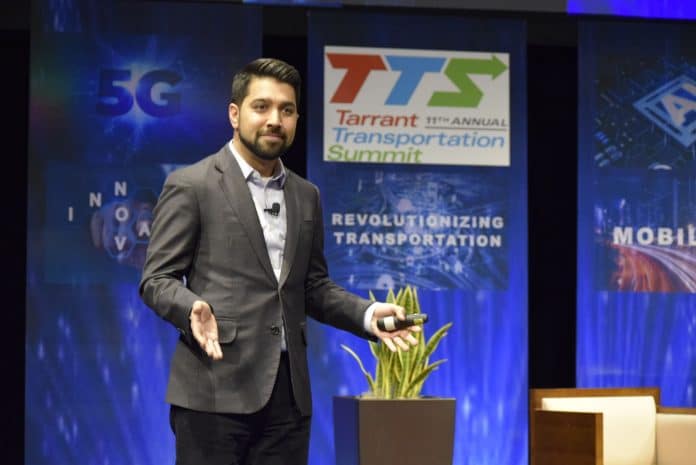The only real certainty when trying to predict the future of transportation is that it is going to happen whether people are prepared for it or not.
Think back more than a 100 years, said Rasheq Zarif, Managing Director and Future Mobility Tech Sector Leader at Deloitte, who was the keynote speaker Valentine’s Day at the 11th Annual Tarrant Transportation Summit.
“What was it like when you were there seeing the first car drive or seeing a light bulb go on instead of lighting a candle or seeing the whole aspect of oil refining and manufacturing? Some of you would be like this is great. Some of you would be like what the hell is going on. We’re in that same space now” he said.
The world, he said, is on the cusp of global mobility innovation. The revolution is going to occur because of the technological development in the last two or three decades and the amount of investment, collaboration and partnerships and the way businesses are changing.
He noted those kinds of developments already in play at AllianceTexas means the revolution is coming to Texas.
Hillwood announced the AllianceTexas Mobility Innovation Zone in 2019 to create a center of innovation to serve as a global catalyst for the future of mobility.
The 26,000-acre development already is home to Fort Worth Alliance Airport, BNSF Railway’s Alliance Intermodal Facility, FedEx Southwest Regional Sort Hub and Amazon Air’s newest regional air hub. Uber and Bell have tested mobile systems there beginning around three years ago.
In another session at the conference devoted entirely to the innovation zone, Mike Berry, president of Hillwood, described how the company looked at the opportunity. Here’s what company leaders asked themselves:
“Is there a better test bed anywhere in the world where companies that are developing new technologies for mobility, some of them were already here, could come and develop and test and partner with others to enhance the speed of commercialization for these different technologies?” Berry said.
Hillwood hired Deloitte to assist with that effort.
“We have a once in a generation opportunity to transform mobility in urban and suburban environments and transportation ops,” Deloitte’s Zarif said. “Texas ¬– specifically North Texas – is prime. It is primed and ready to be in the forefront in disrupting the mobility landscape.”
Deloitte studied 10 cities to examine various mobility solutions to improve quality of life and improve congestion, improve climate considerations and other objectives.
“What was interesting is that there’s not one solution,” Zarif said. “Just like you are unique, your city’s unique, the region is unique, your community’s unique. The way you move is unique and therefore the solutions you need to build are unique. But that’s challenging because that means it’s not scalable.”
But the study did identify some common themes:
• Political will is a determinant of everything. Cities need leaders who are tireless advocates for adopting a “boundaryless” approach and can convene the various players (public and private).
• Having a clear vision requires making hard tradeoffs. The tradeoffs associated with prioritizing different outcomes make it important to match mobility transformation efforts to specific goals and objectives. Simply copying the playbook of another city is unlikely to work well.
• Governance structure matters. Consider creating and empowered mobility management function within city government that has the authority and responsibility to drive initiatives forward and create alignment across all modes of transportation.
• Successful cities have found a source of leverage to attract partnerships, funding and talent to shape their mobility environment.
• Pilots are not always the answer because seamless mobility requires ecosystem thinking. Focus on specific and intended outcomes, not just the process.
• Having data is necessary, but not sufficient – and reinventing the wheel is unnecessary. Understanding what data exists, where it is housed and the rules that govern sharing and exchange is critical to success.






